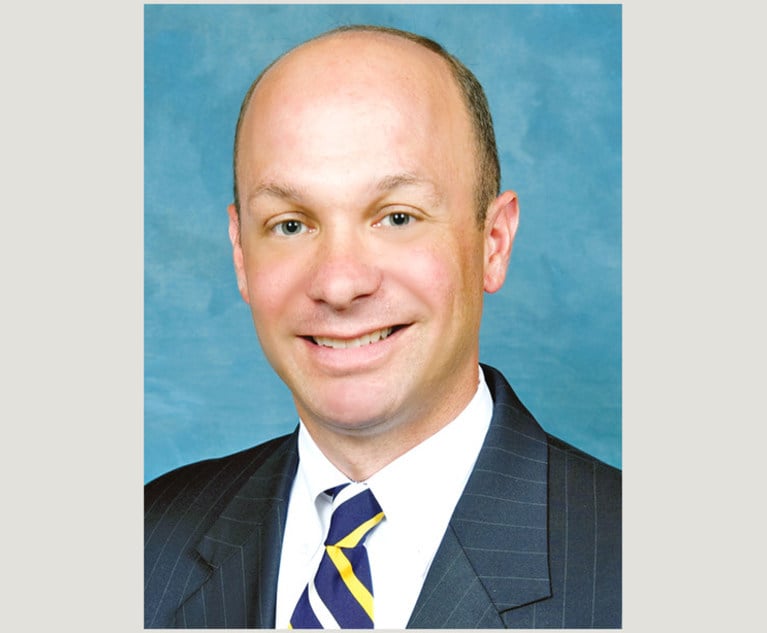 Christian Petrucci of the Law Offices of Christian Petrucci.
Christian Petrucci of the Law Offices of Christian Petrucci. Beware the 'New Normal': Maintaining Professionalism, Legal Skill in Workers' Comp Law
While the original goal was to return to the "old normal" as soon as possible, complete with live hearing, in-person doctors depositions and even some actual paper, it seems that attorneys and judges alike have grown increasingly comfortable with the "new normal." A bit of caution is warranted, however, in letting this new normal degrade the practice.
April 28, 2023 at 12:21 PM
6 minute read
The practice of workers' compensation law has been significantly altered since the COViD-19 pandemic forced practitioners into a virtual practice. While the original goal was to return to the "old normal" as soon as possible, complete with live hearing, in-person doctors depositions and even some actual paper, it seems that attorneys and judges alike have grown increasingly comfortable with the "new normal." A bit of caution is warranted, however, in letting this new normal degrade the practice.
For those who do not practice workers' compensation law or who are not familiar with its history, the concept was brought to the United States after successful forays in Europe at the turn of the 20th century. It was designed, first and foremost, to provide wage-loss replacement for workers injured on the job and support for these workers and their families during times of total disability or work-related death. The law also provided for payment of medical and funeral expenses. Over time, however, in many states, the focus of workers' compensation shifted to a process of making cash payments for "physical impairment" or "permanency" with no regard for a loss of earning capacity. These jurisdictions came to be called "schedule states." Perhaps the most extreme examples of each system are separated by the Delaware River. Pennsylvania is, plain and simple, a wage-loss state, which maintains the integrity of its civil litigation roots and deference to wage loss as the primary focus, notwithstanding the 1996 failed effort to impose the concept of "permanency" on the practice. New Jersey, on the other hand, was one of the first schedule states in the country, having morphed into a largely administrative practice with a singular focus of impairment ratings and their corresponding lump sum value.
This content has been archived. It is available through our partners, LexisNexis® and Bloomberg Law.
To view this content, please continue to their sites.
Not a Lexis Subscriber?
Subscribe Now
Not a Bloomberg Law Subscriber?
Subscribe Now
NOT FOR REPRINT
© 2025 ALM Global, LLC, All Rights Reserved. Request academic re-use from www.copyright.com. All other uses, submit a request to [email protected]. For more information visit Asset & Logo Licensing.
You Might Like
View All
Superior Court Directs Western Pa. Judge to Recuse From Case Over Business Ties to Defendant
3 minute read

Neighboring States Have Either Passed or Proposed Climate Superfund Laws—Is Pennsylvania Next?
7 minute readTrending Stories
Who Got The Work
J. Brugh Lower of Gibbons has entered an appearance for industrial equipment supplier Devco Corporation in a pending trademark infringement lawsuit. The suit, accusing the defendant of selling knock-off Graco products, was filed Dec. 18 in New Jersey District Court by Rivkin Radler on behalf of Graco Inc. and Graco Minnesota. The case, assigned to U.S. District Judge Zahid N. Quraishi, is 3:24-cv-11294, Graco Inc. et al v. Devco Corporation.
Who Got The Work
Rebecca Maller-Stein and Kent A. Yalowitz of Arnold & Porter Kaye Scholer have entered their appearances for Hanaco Venture Capital and its executives, Lior Prosor and David Frankel, in a pending securities lawsuit. The action, filed on Dec. 24 in New York Southern District Court by Zell, Aron & Co. on behalf of Goldeneye Advisors, accuses the defendants of negligently and fraudulently managing the plaintiff's $1 million investment. The case, assigned to U.S. District Judge Vernon S. Broderick, is 1:24-cv-09918, Goldeneye Advisors, LLC v. Hanaco Venture Capital, Ltd. et al.
Who Got The Work
Attorneys from A&O Shearman has stepped in as defense counsel for Toronto-Dominion Bank and other defendants in a pending securities class action. The suit, filed Dec. 11 in New York Southern District Court by Bleichmar Fonti & Auld, accuses the defendants of concealing the bank's 'pervasive' deficiencies in regards to its compliance with the Bank Secrecy Act and the quality of its anti-money laundering controls. The case, assigned to U.S. District Judge Arun Subramanian, is 1:24-cv-09445, Gonzalez v. The Toronto-Dominion Bank et al.
Who Got The Work
Crown Castle International, a Pennsylvania company providing shared communications infrastructure, has turned to Luke D. Wolf of Gordon Rees Scully Mansukhani to fend off a pending breach-of-contract lawsuit. The court action, filed Nov. 25 in Michigan Eastern District Court by Hooper Hathaway PC on behalf of The Town Residences LLC, accuses Crown Castle of failing to transfer approximately $30,000 in utility payments from T-Mobile in breach of a roof-top lease and assignment agreement. The case, assigned to U.S. District Judge Susan K. Declercq, is 2:24-cv-13131, The Town Residences LLC v. T-Mobile US, Inc. et al.
Who Got The Work
Wilfred P. Coronato and Daniel M. Schwartz of McCarter & English have stepped in as defense counsel to Electrolux Home Products Inc. in a pending product liability lawsuit. The court action, filed Nov. 26 in New York Eastern District Court by Poulos Lopiccolo PC and Nagel Rice LLP on behalf of David Stern, alleges that the defendant's refrigerators’ drawers and shelving repeatedly break and fall apart within months after purchase. The case, assigned to U.S. District Judge Joan M. Azrack, is 2:24-cv-08204, Stern v. Electrolux Home Products, Inc.
Featured Firms
Law Offices of Gary Martin Hays & Associates, P.C.
(470) 294-1674
Law Offices of Mark E. Salomone
(857) 444-6468
Smith & Hassler
(713) 739-1250






